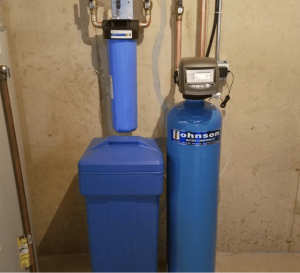Do You Need a Water Softener If You Already Have a Whole-Home Filter? A Pentair Water Softening Contractor in Hoffman Estates, Illinois Explains

Many whole-home filters make your water look cleaner, smell fresher, and taste better. But that doesn’t necessarily mean your water is soft. Without a water softener, hard water can still be a problem in your home. So, what exactly is the difference between a water filter and a water softener?
Below, this Pentair water softening contractor in Hoffman Estates, Illinois is going to explain what each one does, and why using both might be the ideal choice for your home.
Filters and softeners do different things.
At first, a whole-home filter and a water softener might look very similar. Both are installed where water enters your home, and both improve your water. But they do it in different ways.
A filter is made to remove contaminants like chlorine, lead, and particles from dirt or rust. Depending on the type, they might use carbon or reverse osmosis to trap these contaminants. Some filters might slightly reduce hardness, but that is not their main job.
A softener focuses on hard water and removes minerals like calcium and magnesium. These minerals are what create the white buildup you see on faucets or inside kettles. Softeners use an ion exchange method, where they replace hard water minerals with softer ones like sodium or potassium.
Most filters don’t remove calcium or magnesium effectively. So, if you only have a filter, those minerals still flow through your pipes.
Pentair softeners are made to fix this. They use proven ion exchange technology to physically remove hardness minerals from your water. That gives you better results than filtration alone. A professional Pentair water softening contractor in Hoffman Estates, Illinois can test your water and let you know if adding a softener would help.
The damage hard water can do.
Hard water minerals like calcium and magnesium turn into limescale. This builds up in pipes and appliances like dishwashers. Over time, that buildup gets thicker and makes water move slower. Your appliances also use more energy and have a diminished service life.
These minerals also clog filters faster than dirt or sand. As a result, you will be changing cartridges more frequently. That costs more and makes your system work harder.
Hard water also reacts badly with soap. It turns soap into a sticky film, which is what you see on shower doors or around faucets.
This is why many people use both a filter and a softener. The filter cleans the water, and the softener removes the minerals.
The benefits of pairing a Pentair softener with your filter.
When hard minerals are replaced with sodium or potassium, water becomes “soft.” That means less scale on pipes and fixtures, which helps your pipes and appliances last longer. Soft water also feels better on the skin and hair.
Pentair softeners are designed to be efficient. Many of them use a demand-initiated system and only regenerate when needed, based on how much water you use. The process includes rinsing the resin, pulling in brine, flushing it out, and getting ready to soften again.
If your water use changes a lot, a twin-tank system can be a good option. It gives you soft water all the time, even when one tank is regenerating. A Pentair water softening contractor in Hoffman Estates, Illinois can analyze your home’s water hardness and usage to recommend the best setup.
Looking for a Pentair Water Softening Contractor in Hoffman Estates, Illinois?
At Johnson Water Conditioning, we have helped countless homeowners improve their water with a Pentair softener. As the best Pentair water softening contractor in Hoffman Estates, Illinois, we offer free water tests and honest advice on what your home needs. Contact us today to get in touch with our team.

 Better Water for
a Better Life
Better Water for
a Better Life
